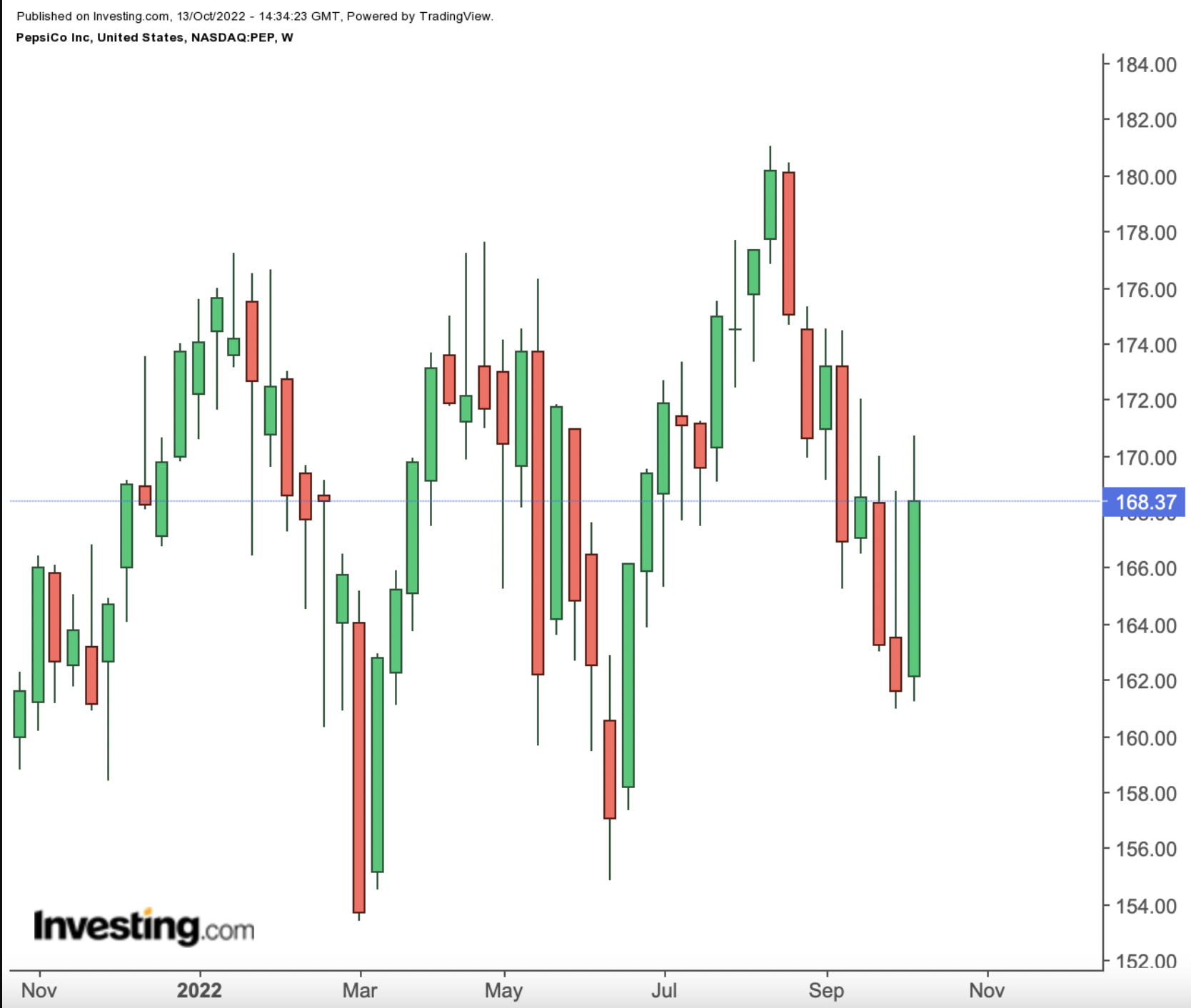
- All Instrument Types
- Indices
- Equities
- ETFs
- Funds
- Commodities
- Currencies
- Crypto
- Bonds
- Certificates
Please try another search

Q3 Earnings Show Why PepsiCo Merits A Premium

- A blowout third-quarter earnings report sent Pepsico stock higher Wednesday
- Ability to manage inflationary environment is impressive
- Report shows why PEP receives surprising premium to KO, and why that premium should hold
It does seem surprising that PepsiCo (NASDAQ:PEP) trades at a premium to Coca-Cola (NYSE:KO). Coca-Cola is the bigger, and presumably better, business—and in the market, that usually wins out.
Lowe’s Companies (NYSE:LOW) trades at a discount to Home Depot (NYSE:HD). Bank of America (NYSE:BAC) has a higher valuation than Citigroup (NYSE:C).
But, in fact, at least based on 2023 estimates, PEP receives a higher valuation than KO. PEP trades at 23.6x forward earnings, against 21.4x for its long-time rival.
In fact, there are good reasons for that gap. Wednesday’s blowout third-quarter earnings report shows that the gap, and the premium assigned PEP stock, may well continue.
Source: Investing.com
The Value Of The Snack Business
Coca-Cola has long been considered one of the best businesses in the world. The Coca-Cola brand is among the world’s most valuable. Profit margins are extraordinarily high, given that the product is just flavored sugar water. KO long has been a core holding of Warren Buffett’s Berkshire Hathaway (NYSE:BRKa); Berkshire now earns annual dividends equal to more than 50% of what the company originally paid to acquire Coke stock back in 1988.
Pepsi’s beverage business simply isn’t as good. But Pepsi’s snack food business might more than make up for that gap. Brands like Ruffles and Fritos dominate their categories in a way that very few food businesses do.
The strength in the snack business was evident in the Q3 report. Frito-Lay revenue increased a stunning 20% year-over-year in the quarter. Operating profit rose 17%, with relatively intact margins showing the brands’ ability to pass along pricing to consumers.
In contrast, Pepsi’s North American beverage business increased profit just 4% on an adjusted basis. That’s solid performance in this kind of environment, but likely will lag the domestic numbers Coca-Cola shows when it reports next week. As long as Frito-Lay — which drove 44% of segment-level profit last year — keeps firing on all cylinders, simply solid performance from beverages is more than good enough.
The U.S. Benefit
There’s another aspect of the report to consider. PepsiCo raised its full-year outlook for revenue and profit growth, despite a modest increase in the expected impact from the stronger U.S. dollar. After Q2, PepsiCo expected currency would hit both revenue and profit by 2% for the full year; in the Q3 release, the headwind was bumped up to 2.5 points.
In contrast, Coke said after its second-quarter release that currency would hit adjusted earnings per share by nine full percentage points. Given the fact that the U.S. Dollar Index has strengthened another 6% since then, the full-year impact is likely to end up being even larger.
The key difference between the two companies is where their profits come from. For PepsiCo, in 2021, about two-thirds of earnings came from North America. For Coke, the proportion was almost certainly less than one-third. (Coca-Cola’s disclosures don’t provide a precise breakdown.)
To some extent, dollar strength will be lapped next year. But in an environment where the dollar retains its strength, Coca-Cola is at a competitive and pricing disadvantage overseas. PepsiCo, simply given the nature of its business, won’t have that same problem.
We’re already seeing the effect this year. After Q2, Coca-Cola projected constant-currency earnings per share growth of 14% to 15%, cut to 5% to 6% as reported. PepsiCo’s outlook post-Q3 suggests slower constant-currency growth of about 10%, and, thus, reported growth of 7.5%.
Will Pepsico Keep Outperforming?
Snacks and currency on their own might not seem to be enough to make PEP the better pick. But there’s one more aspect to consider: PEP already has been the better pick.
In fact, including dividends, PEP has crushed KO. Over a decade, total returns in PepsiCo have been 223%, against 98% for Coke. PEP has outperformed over shorter time periods as well.
Again, that relative performance might seem surprising. But looking closer, it shouldn’t be because the basic assumption that Coca-Cola is the better business might be flawed. Between concentrated exposure to the U.S. and Frito-Lay, it may well be PepsiCo that is the more desirable business. It’s certainly been the more desirable stock.
Disclaimer: As of this writing, Vince Martin has no positions in any securities mentioned.
Related Articles

One chart shows the details of an important historical analog for gold stocks Through many years of frustration among gold bugs due to the failure of gold stock prices to leverage...

Tesla (NASDAQ:TSLA) (NYSE: TSLA), the electric vehicle giant, has recently experienced a significant drop in its stock value, which has fallen nearly 45% since December. This...

STAT The current bull market has been extraordinary. As Bridgewater reports, “Out of any 15-year period to be invested in equities dating back to 1970, the one we’ve just lived...
Are you sure you want to block %USER_NAME%?
By doing so, you and %USER_NAME% will not be able to see any of each other's Investing.com's posts.
%USER_NAME% was successfully added to your Block List
Since you’ve just unblocked this person, you must wait 48 hours before renewing the block.
I feel that this comment is:
Thank You!
Your report has been sent to our moderators for review






Add a Comment
We encourage you to use comments to engage with users, share your perspective and ask questions of authors and each other. However, in order to maintain the high level of discourse we’ve all come to value and expect, please keep the following criteria in mind:
Perpetrators of spam or abuse will be deleted from the site and prohibited from future registration at Investing.com’s discretion.